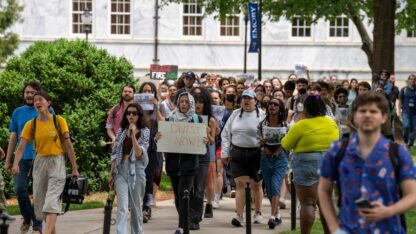Georgia Gov. Brian Kemp's 2024 State of the State address, annotated
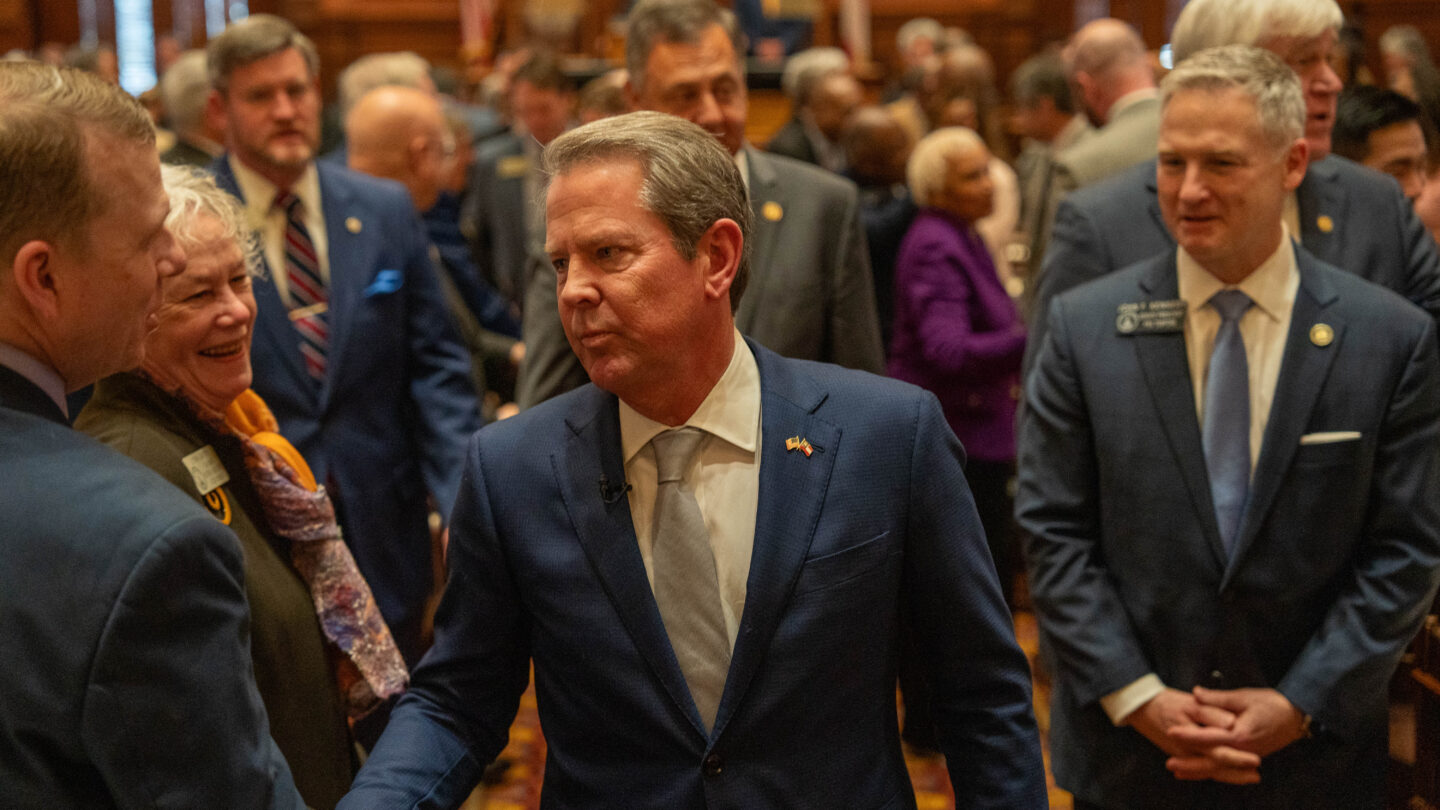
In his sixth State of the State address, Republican Gov. Brian Kemp did not waste any time acknowledging the election looming later this year.
By the second sentence, Kemp began telling a chamber packed with Georgia lawmakers how Georgians vote in 2024 will “determine what course America takes in the years to come.”
Kemp used his address to draw contrasts between government in Washington and Georgia, painting the state as an oasis of prosperity and limited government, while Congress has become “synonymous with runaway spending, bloated budgets, job-killing regulations, gridlock and partisanship.”
Kemp’s speech emphasized pocketbook-focused priorities such as tax cuts and raises for state employees, including teachers. He also expressed his renewed support for a school voucher proposal and ongoing investments in mental health.
He underscored his stalwart support of the controversial Atlanta Public Safety Training Center and touted his limited program to expand access to health care – without mentioning discussions bouncing around the capitol about a potential deal to more fully expand Medicaid.
Absent were mentions of other hot-button topics like abortion or voting laws.
WABE reporters and editors have annotated Kemp’s address, as prepared for delivery, with context and fact checks. Click the links below to jump to different topics Kemp covers throughout his speech, which you can watch in its entirety here.
Lt. Governor Jones, Speaker Burns, President Pro Tem Kennedy, Speaker Pro Tem Jones, members of the General Assembly, Constitutional Officers, members of the Public Service Commission, Mayor Dickens, members of the judiciary, members of the consular corps, and my fellow Georgians:
Later this year, the people of this state will once again fulfill their civic duty, they will choose who occupies these seats of service, and they will determine what course America takes in the years to come.
If you feel like 2024 is heating up fast, you’re not alone. Gov. Kemp did not waste any time before diving into the stakes of the upcoming 2024 election. Georgia will again be one of the most closely-contested states in the presidential election. The margins have also been narrowing in the state legislature, but few seats are competitive due to gerrymandering. Kemp’s focus on drawing contrasts between the federal government in Washington, D.C. and Georgia is notable. President Biden is only mentioned once by name in this speech. Former President Trump, the frontrunner for the GOP nomination, is not mentioned at all. -Sam Gringlas, Politics Reporter
As they have in years past, when they go to the ballot box, they’ll see a stark difference between Georgia and our nation’s capital.
They will see what we’ve achieved together on the state level to make Georgia an even greater place to live, work, and raise a family, and they’ll see the hardships Washington D.C. has brought into every home and placed on every kitchen table across our state.
Congress has become synonymous with runaway spending, bloated budgets, job-killing regulations, gridlock and partisanship, and elected representatives in both parties who are more interested in getting famous on cable news than delivering results for the American people.
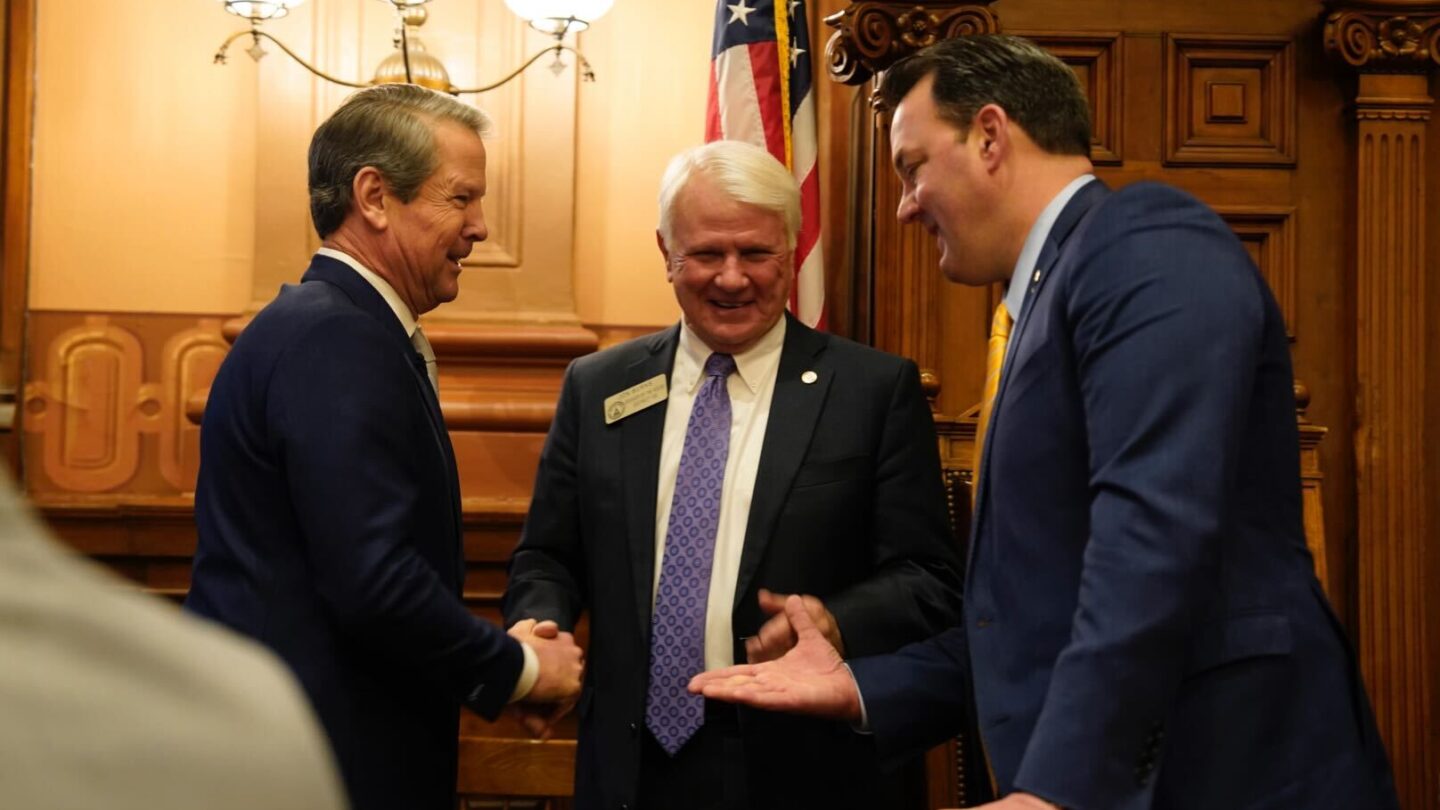
All the while across the nation, over 60 percent of households are living paycheck to paycheck. Over 8.4 million Americans are working two jobs to make ends meet. Mortgage rates remain at highs not seen in a generation.
And while the rate of inflation may have fallen, high prices on everything from groceries to rent have not.
In fact, it costs Americans over 11,000 dollars more per year to maintain the same quality of life they had just a few short years ago.
This is based on an analysis from Republican members of the U.S. Senate Joint Economic Committee. They found that, as of November 2023, it costs Americans an additional $11,434 annually to maintain the same standard of living they had in January 2021. The number was about the same in Georgia, according to the analysis. -Patrick Saunders, Supervising Digital News Editor
For the hardworking men and women of this country, paying 11,000 dollars more a year is not a choice between the luxuries of life.
For too many people, that’s a decision between putting food on the table for their family, making your car payment, buying clothes for their kids, or going further into debt.
For a recent graduate, it’s about whether you can afford to get your own place and pay off student loans.
For a single mom, it’s a decision about taking that new job in a career that pays better, but it doesn’t offer affordable childcare.
For a family of four, can they make ends meet when saving for their kids’ college and paying their mortgage?
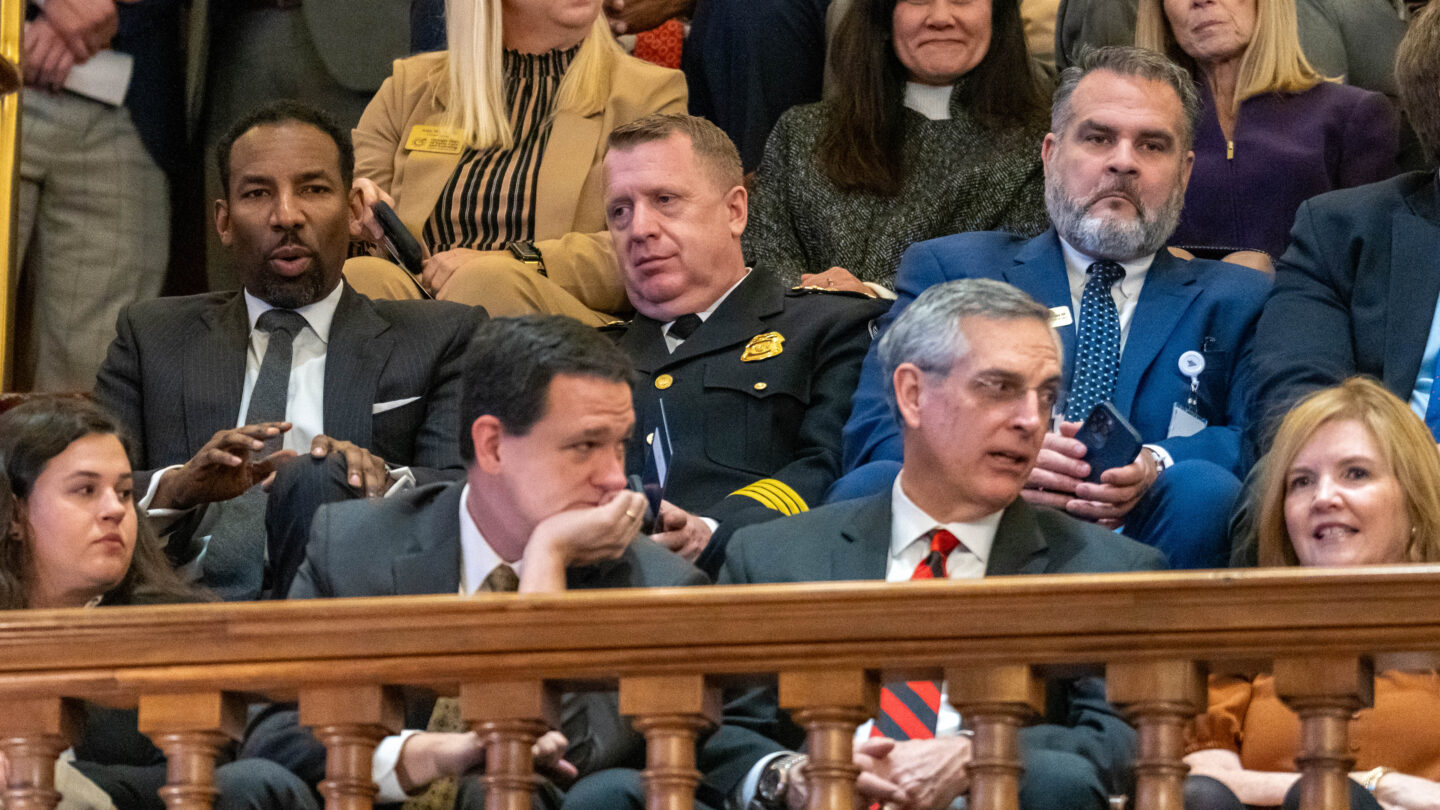
And for our seniors, are they able to stretch a fixed income to meet their basic needs?
These are the people that Washington D.C has left behind. Because for every challenge our nation faces, the federal response is to spend more, regulate more, tax more, and come up with yet another government program meant to cure every ill.
Instead of empowering hardworking Americans to innovate, create, and seek greater prosperity, their answer is more government.
But here in Georgia, we’ve chosen a different path.
Because we realize that the success of our state does not rely on the actions of government, but on the prosperity of our people.
Washington D.C forgot a long time ago that it’s not the brilliance of politicians or the good intentions of a new program that make our nation great.

It’s the resolve, ingenuity, and character of the American people.
Those were the hardworking Georgians we heard from on the campaign trail.
As a family, we heard their stories, their struggles, and their hopes for a brighter future.
And as you all know, that was truly a family affair. And I want to thank Marty, Jarrett, Lucy, and Amy Porter for being there every step of the way – including today!
My commitment to the people of our state was simple. I promised to put hardworking Georgians first, fund our priorities as a state like education, public safety, and healthcare, but also keep government efficient, responsible, and accountable.
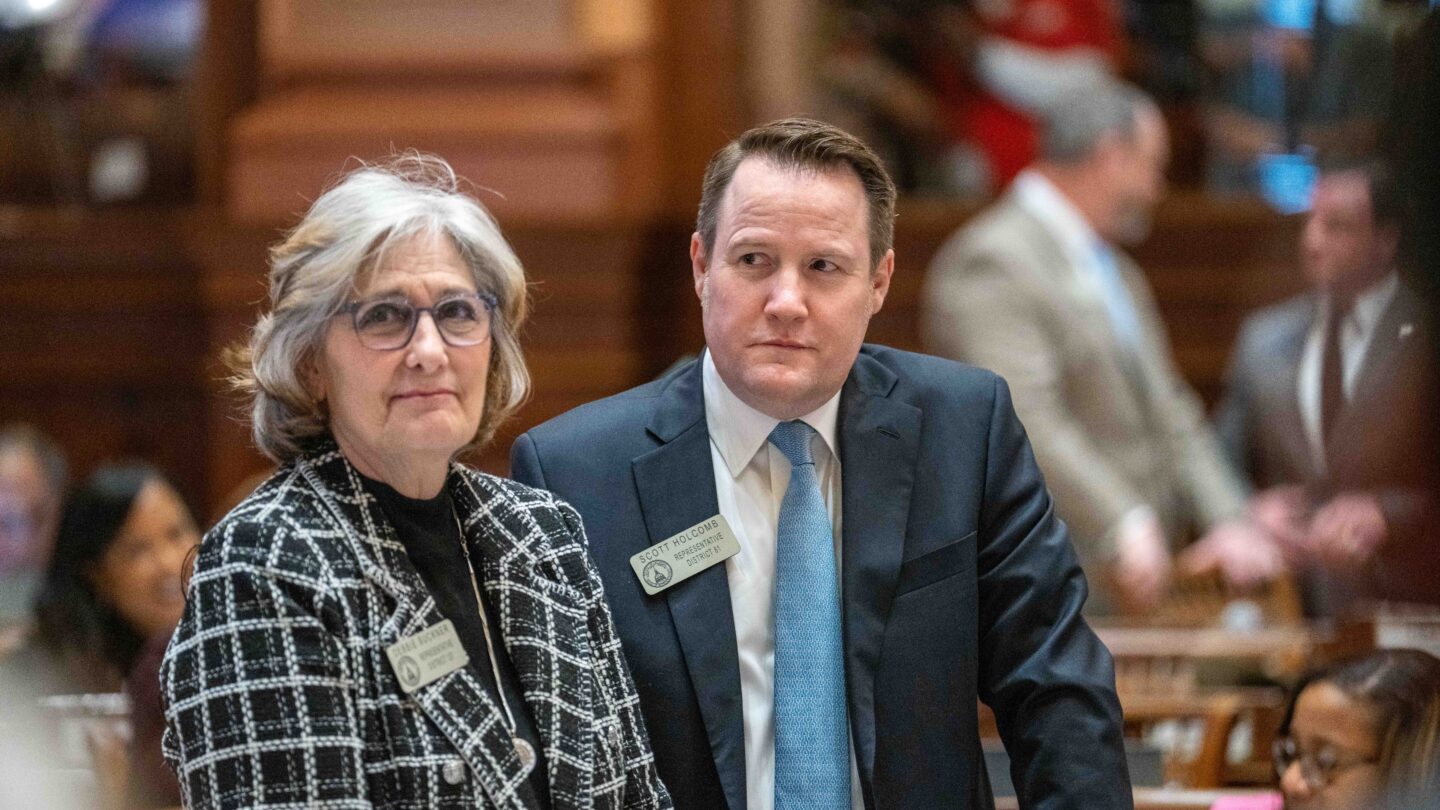
The federal government may have abandoned those principles, but here in Georgia, thanks to the partnership between my administration and the General Assembly, we’ve delivered real results for the people of our state, ahead of schedule and under budget.
Thanks to a strong economy and conservative fiscal management of state revenues, we’ve provided nearly 5 billion dollars of direct relief to taxpayers in tax refunds, gas tax suspensions, homestead tax exemptions, and more.
Despite unprecedented challenges, we have maintained a Triple-A bond rating while celebrating the creation of more than 171,000 new jobs and roughly 74.5 billion dollars of investment in every corner of the Peach State over the last 5 years!
This includes more than 45 e-mobility projects that have contributed over $25 billion in investments in Georgia, according to the state. -Marlon Hyde, Business Reporter
And unlike a lot of blue states, these are private sector jobs – not growing the ranks of government!
And we’re not done yet.
Last month, I joined Lt. Governor Jones, Speaker Burns, and others to announce our plan to speed up implementation of the largest tax cut in state history.
With your support, I look forward to signing legislation that decreases our state income tax to 5.39 percent starting this year.
The current state income tax rate is 5.49%. Proposed legislation is expected to accelerate scheduled cuts down to 4.99% by 2028, instead of 2029. – Rahul Bali, Politics Reporter
That represents savings of 3 billion dollars for Georgia taxpayers over the next ten years.
Mr. Speaker and Lt. Governor, while President Biden hires tens of thousands of new IRS agents, my vote is we just keep cutting taxes here in Georgia!
The path Georgia has taken over the last five years has led to record job growth, historic investment in communities from Bainbridge to Blue Ridge, 5 billion dollars in tax relief, and enough funds saved to operate state government for months in an emergency, not days.
That’s the choice before Georgians this November, and I feel confident they’ll vote to keep Georgia moving in the right direction once again.
So, to answer the question, the state of our state is strong, growing, and prosperous because we trust our citizens more than we trust the government.
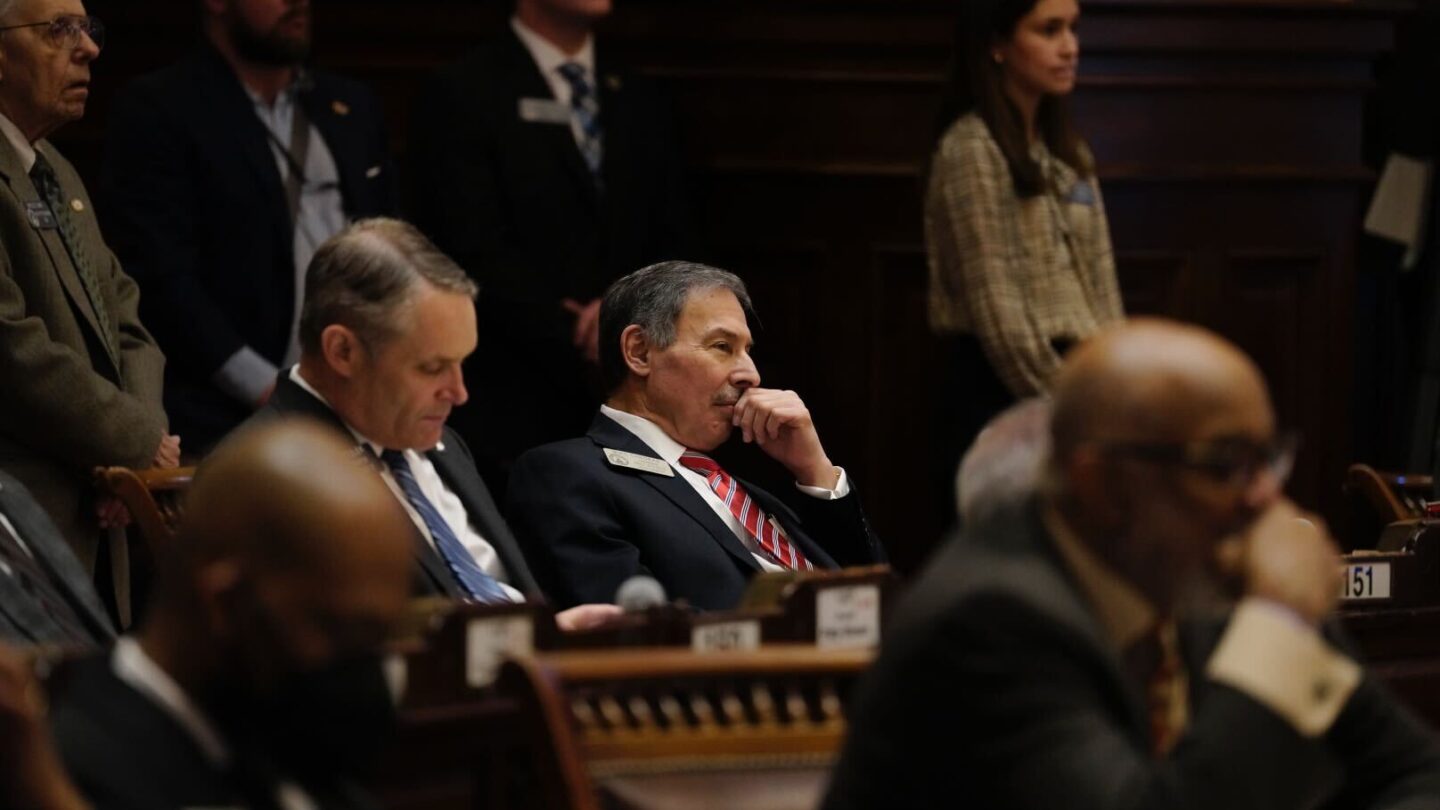
Georgia is succeeding because we’ve charted our own path, rejected the failed policies of Washington D.C, and worked together to put our citizens first.
But I believe the worst thing we could do is call it a day and coast through what is certain to be a contentious election year.
We have accomplished so much over the last five years – despite unprecedented times and challenges – because we haven’t gotten distracted from doing the job we were all sent here to do.
Like I mentioned four years ago in my second state of the state address, we stayed true to the example of Nehemiah, committed to our great work, and now we’re seeing the results.
It’s no secret that Georgia is growing. As the top state for business for a record ten years in a row, new jobs are headed our way on a daily basis, existing businesses are looking to expand, and companies all over the world look to the Peach State to locate their next headquarters.
According to Georgia Republicans, businesses establish themselves here because of the state’s business-forward policies and state incentives. But Democrats point out that federal funding, such as from the Inflation Reduction Act and Bipartisan Infrastructure Law, has also contributed to the growth of Georgia’s EV and solar industries. Battery manufacturers that produce for Hyundai like SK and LG Energy Solution plan to build battery plants here in the next few years as EV and solar companies continue to jockey for credit between the state and the feds. -Marlon Hyde, Business Reporter
But with growth comes the need for more trained workers to fill these good-paying jobs in a rapidly changing labor environment.
It is worth noting that according to survey data from the nonpartisan Migration Policy Institute, there were more than 200,000 workers in Georgia who were undocumented as of 2019. There are even more workers in Georgia who are here on seasonal visas to work in agricultural roles. According to the USDA, Georgia has one of the higher numbers of temporary agricultural work visas issued per year. In 2022, around 30,000 migrant workers received visas to come to Georgia and work in agriculture. -Emily Wu Pearson, Immigration & Communities Reporter
That’s why I was proud to unveil the Georgia MATCH program at last year’s Workforce Summit.
Though the governor calls Georgia MATCH a “direct college admissions” program, the MATCH letters are not college acceptance letters. They just tell students which colleges they’re academically eligible for, based on their grades in high school. The benefit of a program like this is it reaches students who wouldn’t otherwise think about applying to college, letting them know they’re likely to get in if they were to apply.
The following disclaimer is included on the Georgia MATCH website: “The colleges and universities listed on the student’s GEORGIA MATCH letter or Dashboard represent a provisional acceptance only and does not guarantee acceptance to a college or university or a specific major/program of study. An official admissions status is determined by the college or university using their admission criteria and the student’s final transcript and high school graduation status.” -Juma Sei, Education Reporter
The largest direct college admissions program in the nation, Georgia MATCH is already doing an incredible job linking the upcoming generation with the school that meets their needs.
As of today, over 10,000 students have already “met their match,” and we will keep working to reach every high school senior in Georgia, so that they know there is a higher education path open to them right here in the Peach State, no matter their circumstances.
Speaking of education, my amended 2024 budget and fiscal year 2025 budget proposals double down on our continued and historic support of K thru 12 education with 1.4 billion dollars in additional funds allocated for a total of 12.8 billion dollars.
This is true. Among other things, that money will go toward:
- A previously-announced one-time, $1,000 salary supplement for state employees, certificated K-12 employees, and Pre-K teachers and assistant teachers for recruitment and retention purposes.
- Continued funding for the state’s Quality Basic Education formula, which determines how much money is given to public schools.
- Workforce development program through the Technical College System of Georgia to address the need for folks trained to enter the electric vehicle industry.
-Juma Sei, Education Reporter
Republicans and Democrats alike have supported this record investment in our students, and I want to take a moment and thank all of you for that strong, bipartisan achievement.
Kemp uses the word “bipartisan” three times in this speech — twice in reference to education funding and once in declaring bipartisan support for the Atlanta Public Safety Training Center. The state budget typically passes with bipartisan support. Many other measures also attract bipartisan support, though they don’t often take up as much oxygen as controversial bills that live or die along partisan lines. Republicans can pass their priorities without Democratic votes as long as they remain mostly unified. But Democrats can exercise power on issues like vouchers or online sports betting that do not enjoy universal GOP backing. There is also talk of a grand compromise to expand Medicaid more fully – a long-held dream of Democrats. More on that later. – Sam Gringlas, Politics Reporter
It’s also important for us to remember that increased funding does not always guarantee greater success.
As a small business owner for almost forty years now, I believe – like many of you – that competition and the free market drive innovation and, at the end of the day, result in a better product for the consumer.
When it comes to education, the same principles hold true.
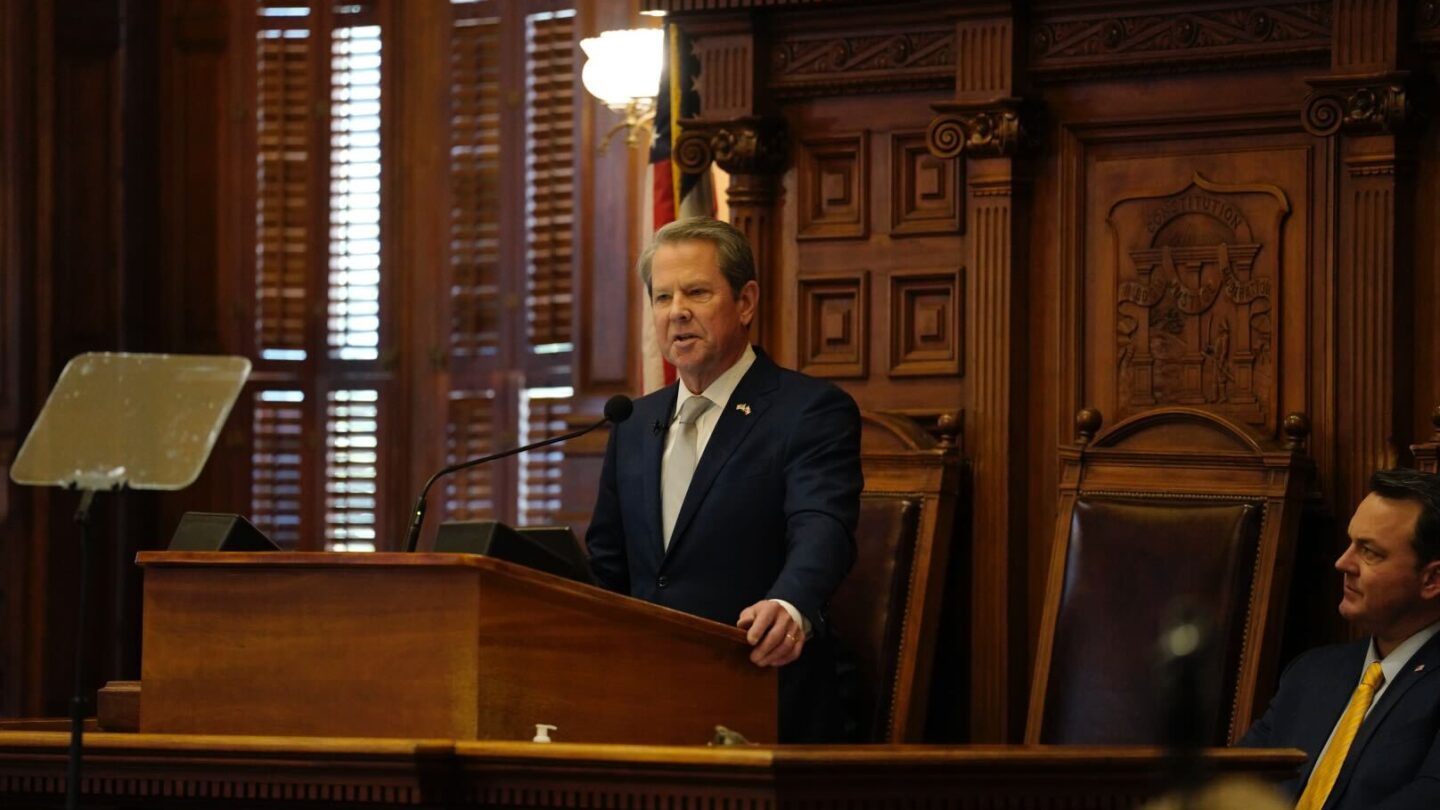
Over the last few years, there has been a great deal of debate around different proposals to expand options for students and families when it comes to finding the education that best fits their individual needs.
Many members in both chambers have worked hard on this important issue and I want to thank and applaud them for their efforts.
Some prefer the term school choice or educational freedom, some call them vouchers.
The vouchers bill is a big deal. The program would give money (about $6,000) to families that want to send their kids to private school, or have them study at home. Only families with kids at public schools performing in the bottom 25% would be eligible. Opponents of the vouchers program say it would divert public tax dollars away from public schools. But supporters say parents should be able to send their kids where they want. The bill came just six votes shy of passing last year (89-85). The result was a major blow for Republican leaders, who expected the bill to pass; 16 members of their party joined House Democrats to hamstring the legislation, sending it back for further consideration. The bill is likely to come up again this session, but none of the Republican No’s have suggested that they will flip. -Juma Sei, Education Reporter
In my opinion, what each of those terms or slogans fail to mention is the child. At the end of the day, our first and foremost consideration should be the future of that student.
Our job is not to decide for each family, but to support them in making the best choice for their child.
This week, as we begin the second year of another biennial of the General Assembly, I believe we have run out of “next years.”
While this refers to school choice, another bill that has languished for years regarding Georgia students is one granting in-state tuition for DACA recipients, many of whom have only ever been educated in the state of Georgia but must pay out-of-state tuition to go to a public university or college here. -Emily Wu Pearson, Immigration & Communities Reporter
I firmly believe we can take an all-of-the-above approach to education… whether it’s public, private, homeschooling, charter, or otherwise.
It is time for all parties to get around a table and agree on the best path forward to provide our kids the best educational opportunities we can – because that’s what we were elected to do.
To that end, my office and I look forward to working with the members and leadership of both chambers to get a bill passed and signed into law this session.
Finally, our students and teachers deserve to have a safe learning environment, no matter their zip code.
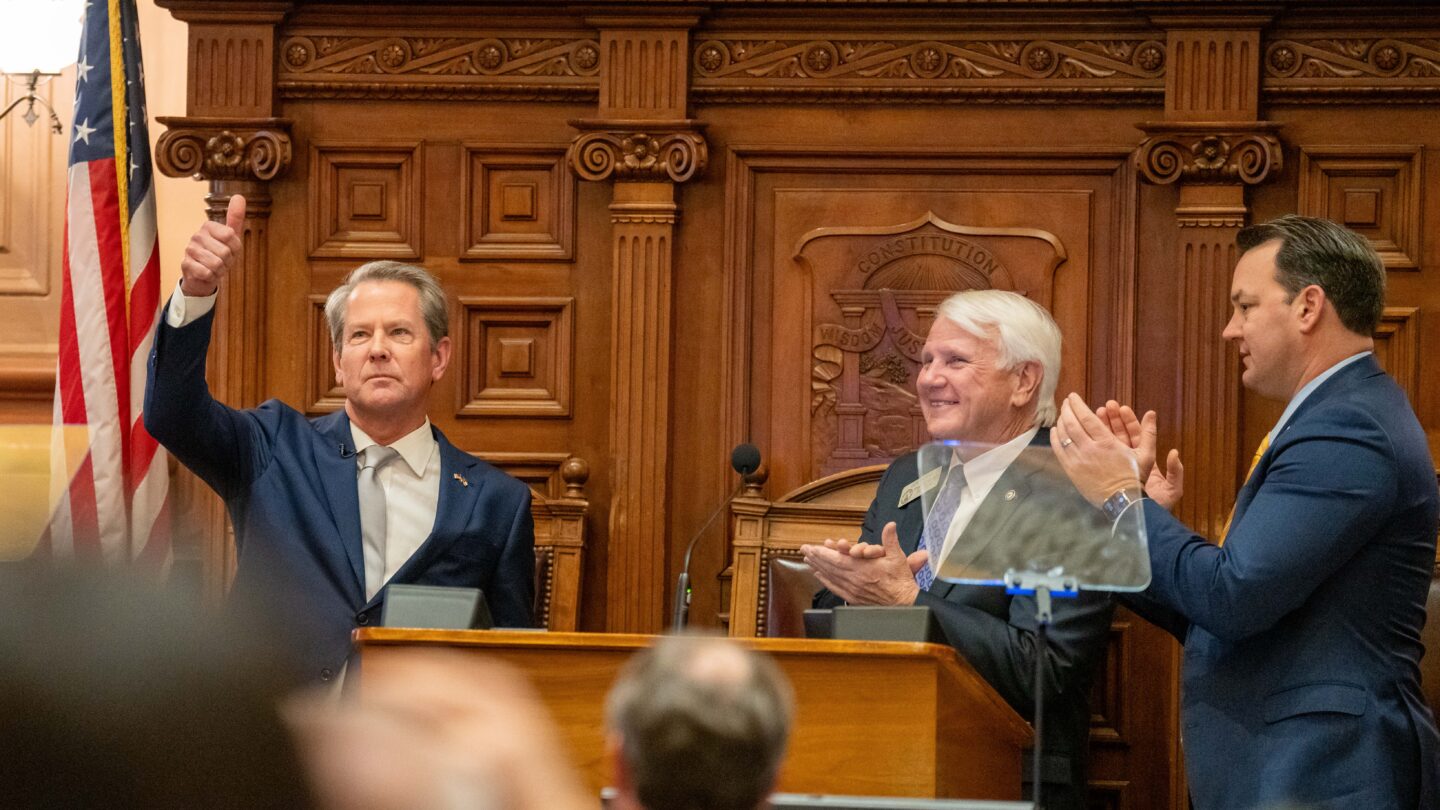
Since I took office, I have had the opportunity to hold more than 30 roundtable discussions with educators and superintendents from all over this state. We heard frequently that our schools were in need of additional resources to enhance this security.
That is why since 2019, we have provided more than 185 million dollars to all of our schools to help ensure the safety and well-being of our students and teachers.
This year, I am proposing we continue those efforts by making school security funding permanent. In my budget proposal, I have included a request for 104 million dollars that will go directly to school districts for school safety enhancements.
This proposal would translate to $45,000 per public school per year. What makes these different from past one-time grants is that this will be a yearly budget item, likely allowing school districts to use them for personnel like school resource officers. -Rahul Bali, Politics Reporter
Schools will determine how best to use this money, whether for personnel like school resource officers or for physical and technology improvements that make our places of learning more secure.
This investment is more significant because it will enable schools and administrators to plan accordingly, knowing that this money is headed their way for this specific purpose.
I hope to see strong bipartisan support for this budget item to keep our kids and our schools safe.
Since being sworn in as your 83rd governor, a top priority of my administration has been ensuring the safety and security of our communities.
There’s no doubt we have made great progress. From the GBI’s Anti-Gang Taskforce and HEAT Unit, and the Department of Public Safety’s Crime Suppression Unit, to the First Lady’s GRACE Commission, the Attorney General’s Human Trafficking Prosecution Unit, and the school security measures I just mentioned, we have not wavered in our commitment to strengthening public safety.
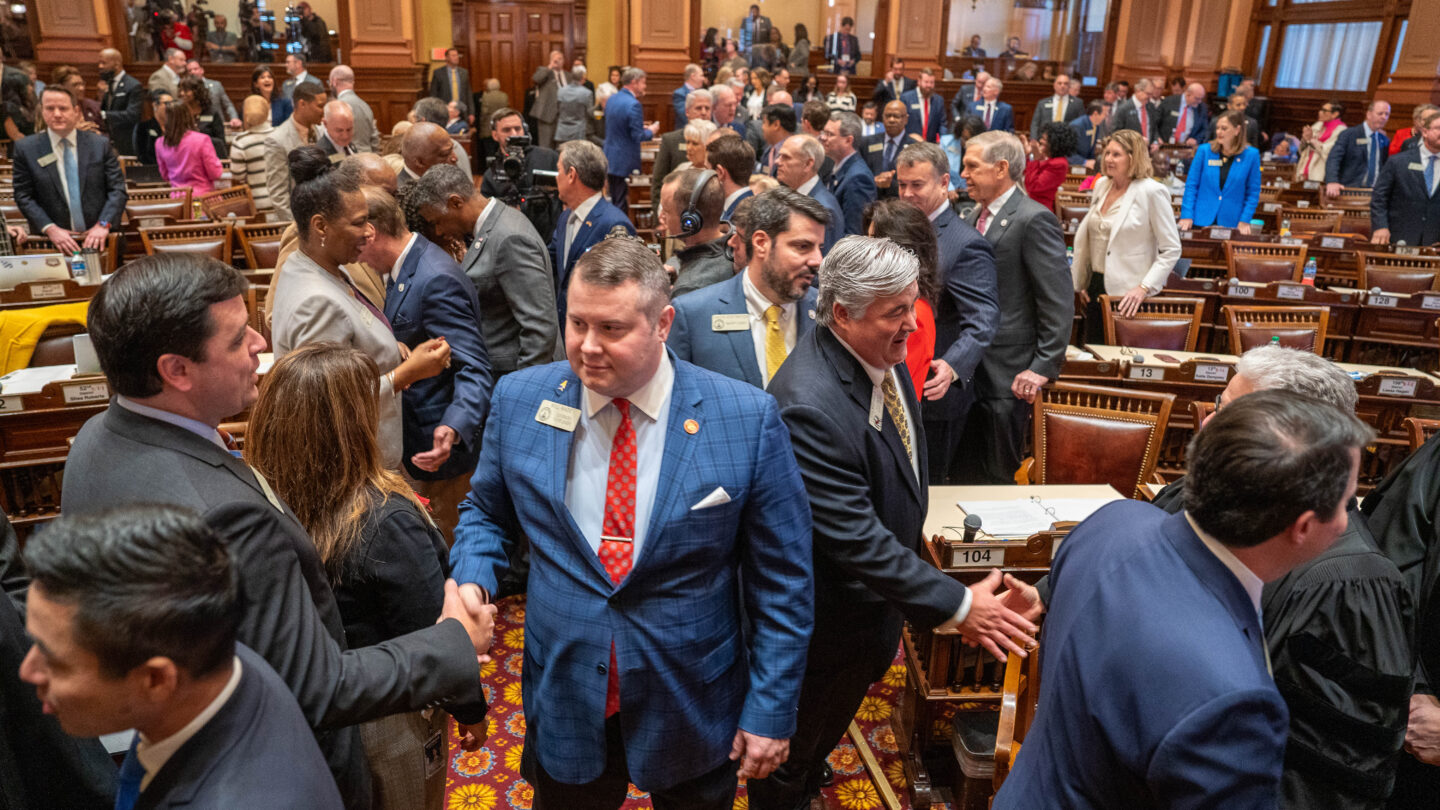
But the state can’t do it alone. Thankfully, over the last two years, we have had strong partners at the local level who have worked alongside state law enforcement to make our capital city safer.
Two of those gentlemen are here with us today, and I want to take a moment to thank Mayor Dickens and Chief Schierbaum for their partnership.
While the mayor and I come from different political parties and don’t agree on everything, we do agree on the importance of reducing crime and keeping our citizens safe.
Bipartisan majorities of both chambers, the mayor, and myself all agree on the critical need for the completion of the Atlanta Public Safety Training Center.
The 85-acre, $90 million police and fire training facility, called “Cop City” by protestors, is expected to include a shooting range, a mock village and a burn center. Supporters say it’s needed to replace the city’s current outdated and inadequate training facilities and to help recruit and retain more officers. As of October, the Atlanta Police Department employed 1,574 officers out of an authorized strength of 2,051, leaving nearly a quarter of sworn officer positions vacant, according to data provided by the department. However, protestors say they worry the facility will further militarize police and impact the environment in an area surrounded by low-income, majority-Black neighborhoods. Scores of protests and legal battles have been ongoing for more than two years now. -Chamian Cruz, Criminal Justice Reporter
This facility will provide our law enforcement officers, firefighters and additional first responders the critical tools, knowledge, and skills needed to keep themselves and our communities safe.
One of our brave public safety officers is here with us this morning.
Exactly a year ago this week, this dedicated trooper was shot and severely wounded near the site of the future training center.
On Jan. 18, 2023, multiple law enforcement agencies entered a forest to clear the site of protestors where the Atlanta Public Safety Training Center is being built. They had been camping there for more than a year. The land is owned by the city of Atlanta but sits in unincorporated south DeKalb County. The Georgia Bureau of Investigation alleges that 26-year-old environmental activist Manuel “Tortuguita” Teran fired the first gunshot from inside their tent after ignoring officers’ orders and refusing to come out. That’s when six state troopers allegedly returned fire. However, the agency says there is no body cam or dashcam footage of the incident, only the aftermath, because troopers are generally not equipped with body cameras. An autopsy commissioned by Teran’s family later showed Teran suffered more than a dozen gunshot wounds while sitting cross-legged on the ground, with both hands in the air. The autopsy states it’s impossible to know whether Teran was holding a gun. And in October, a special prosecutor assigned to investigate the case said that the use of force against Teran was reasonable, and no charges would be filed against the officers involved. -Chamian Cruz, Criminal Justice Reporter
He spent weeks in the hospital fighting for his life, he endured multiple surgeries, and spent the better part of this year in recovery while his family stood strong beside him.
Marty and I were honored to spend time with him while he was in the hospital, and I was honored when he gave me one of my most prized possessions: his SWAT challenge coin bearing his badge number.
He had that coin on him when he was shot that horrible day, and it is a constant reminder of the price paid by men and women like him all over this state who keep our children, our homes, our businesses, and our streets safe.
Trooper First Class Jerry Parrish, will you please stand with your wife Kelli and let us thank you for your great service?
Thank you to the entire Parrish family for your service, your bravery, and the sacrifices you’ve made over the past year for us.
We’re also joined in the gallery by some brave men who rendered life-saving aid to Trooper Parrish on site and who helped get him to safety.
They represent some of our very finest from both the Department of Public Safety and the Department of Natural Resources. Will you all please stand and let us thank you for your inspiring actions?
I don’t claim to speak for anyone else in this chamber today, but this decision is very simple for me and my family.
As long as I’m your governor, there will be no gray area or political double talk:
We support our law enforcement officers.
We support our firefighters and first responders.
And the Atlanta Public Safety Training Center should be built – period!
The first phase of the center is projected to open by the end of the year. More than 60 people have been indicted on racketeering, or RICO, charges related to protests against so-called “Cop City.” It’s unclear when they are expected to go to trial. At least one defendant’s demand for a speedy trial has already been delayed.
There is also an ongoing legal battle over the validity of a signature drive that organizers launched over the summer to try to get the issue on the ballot. The effort had never been done before in the history of the city of Atlanta. But after collecting more than 100,000 signatures, city officials refused to begin the verification process. Appellate judges heard arguments on the deadline and petition witness issues in December. The city also argues the underlying petition is void because it violates state law and would illegally cancel a contract with the private nonprofit Atlanta Police Foundation to build the facility. While a decision has not been reached, it’s unlikely that the issue will make it to the ballot in March. –Chamian Cruz, Criminal Justice Reporter
Article I, Section I, Paragraph II of the Georgia Constitution states: “Protection to person and property is the paramount duty of government and shall be impartial and complete.”
To fulfill that paramount duty, we must do more than show our support for law enforcement in words. We have to show it through action.
That is why last year, thanks to the work of the General Assembly, I was proud to sign a budget that included a 6,000-dollar pay raise for state law enforcement officers. That pay raise was a recognition of the contributions these brave men and women make as they put their lives on the line, day in and day out.
And this year I look forward to working with each of you to, once again, provide another pay raise for state law enforcement.
Within my budget proposal are pay increases of an additional 3,000 dollars for State Patrol officers like Trooper Parrish, as well as our correctional officers and other state law enforcement agencies.
These investments will not only serve as a renewal of our commitment to these law enforcement officers, but will also support our ongoing recruitment and retention efforts.
I’m also urging the General Assembly to complete what we started last year and give final passage to the peace officer loan repayment program.
Because despite what some may say, we need more police officers, not fewer.
This year we will also be continuing our efforts to combat human trafficking in our state, thanks to the leadership of the greatest First Lady in the country, Marty Kemp!
Thanks to her work, and that of the GRACE Commission and members of both chambers, Georgia has gone from being known as a human trafficking destination to being known as the leader in going after traffickers and supporting victims.
Under the First Lady’s leadership, and with overwhelming support from both chambers, we have passed and signed into law 8 pieces of legislation that go after those who work in this evil enterprise while also supporting the victims.
Our efforts have enabled the GBI’s HEAT unit to investigate 369 cases of human trafficking since its creation and for Attorney General Carr’s Human Trafficking Prosecution unit to secure 32 convictions while assisting in the rescue of over 129 victims since it launched.
But we still have work to do, and Marty and I are both looking forward to working with each of you this session to keep up this fight.
Five years into my administration, when it comes to healthcare, we have made enormous strides in lowering costs, expanding access, and incentivizing more healthcare providers to give care.
We began this work with the passage of the Patients First Act in 2019, and since then, we’ve seen strong results.
In 2019, no counties in Georgia had more than 2 health insurance carriers. Today, 87 percent of Georgia counties have three or more carriers.
And thanks to Georgia Access and the reinsurance program, enrollment in the private sector exchange over the past five years has grown from just under 460,000 to over 1.2 million Georgians.
Last year, Gov. Brian Kemp signed legislation reversing an earlier law blocking Georgia from establishing its own state-based healthcare exchange under the Affordable Care Act. The blockade had meant Georgians looking for private plans shopped directly on the federal Healthcare.gov website. Now, Georgia Access offers the option to shop through the state exchange, as well as directly on HealthCare.gov. Georgia Access also links to third-party insurance broker and agents.
Kemp had originally sought for Georgia Access to divert shoppers away from HealthCare.gov in favor of private brokers, who could sell both health plans that offered the minimum coverage benefits required under the Affordable Care Act, as well as policies that offered lesser benefits. The Biden administration blocked Kemp’s plan. Kemp later agreed that Georgia’s state-based marketplace would only offer federally approved health insurance policies. Kemp has said Georgia’s state-based marketplace will bring “further competition to the field.” The Kemp administration has pegged the cost of GeorgiaAccess.gov at least $31 million. -Jess Mador, Health Reporter
Georgia Access is also saving hardworking families more and more in their wallets.
In all, we’ve reduced premiums by an average of 11 percent across the state. That represents an average annual premium reduction of almost 929 million dollars a year.
Georgia’s state subsidies to health insurers help to lower premiums for some shoppers on the private health insurance marketplace. Federal subsidies have also increased, in part due to funding from the Inflation Reduction Act. This year, the Biden administration estimates nine out of 10 people qualify for discounted plans. A record number of Americans have signed up for Affordable Care Act plans this year. The latest data show more than 20 million people have selected a plan during 2024 open enrollment, which began last November. This includes more than 1.2 million signups in Georgia via HealthCare.gov. -Jess Mador, Health Reporter
In rural counties, where premium prices were the least affordable when I took office, Georgia Access has reduced premiums by an average of 29 percent.
While some in the media refuse to acknowledge this significant progress, we’ll continue to support policies that work for Georgians – not political narratives.
Because the fact is that for individuals and families struggling to make ends meet, lower insurance costs and more choices lead to better care that they can actually afford.
And because we have made sound policy choices, budgeted conservatively, and prioritize innovation and efficiency, we’re able to make other important investments in the health and wellbeing of hardworking Georgians.
That includes our efforts in mental health.
Two years ago, I was proud to sign into law the Mental Health Parity Act, a fitting capstone to the late Speaker David Ralston’s years of service in this chamber, and one that leaves a lasting legacy.
The House Bill 1013 Mental Health Parity Act mandated Georgia health insurers provide mental health coverage at the same level as coverage for physical conditions. The law for the first time brought state regulations into compliance with federal parity law. The landmark legislation highlighted gaps in Georgia’s mental healthcare system and laid out a multiyear roadmap of reforms for lawmakers to tackle.
Last year, lawmakers failed to pass the follow-up H.B. 520. The package included boosts in funding for mental health and addiction treatment programs, recruiting more mental health workers, and targeted resources for Georgians with mental illness who continually cycle between hospitals, jails and homelessness. Bill talks broke down amid a Senate Republican debate over so-called Certificate of Need rules. The regulations determine where in the state new hospitals and medical centers are permitted to open and operate. This year, top GOP lawmakers say they are open to discussing Certicate of Need, or CON, changes. -Jess Mador, Health Reporter
One of the most visible examples of that legacy was the 9-8-8 crisis hotline campaign, conducted by the Department of Behavioral Health and Developmental Disabilities last year.
Thanks to Commissioner Kevin Tanner and his team, more Georgians than ever before are accessing services and the help they need to turn their lives around for the better.
To enhance this program further, my budget proposals call for a total increase of 205 million dollars for DBHDD and other entities that address mental health.
This new funding will enable DBHDD to expand services for those struggling with mental illness, it will increase the number of crisis beds throughout the state, it will further crisis intervention resources in all communities, and improve the quality of mental health services overall.
Some things that have failed to pass the state House in the past regarding mental health care for immigrants may pop up again this session. That includes multilingual and cultural sensitivity training for those responding to mental health crisis calls, and the ability to grant licensure to practice in Georgia for mental health counselors from other countries who have their licenses there, as there is a severe need. A recent health care survey by the Latino Community Fund of Georgia found there were about 100 Spanish-speaking psychologists in the state. -Emily Wu Pearson, Immigration & Communities Reporter
Once passed, we will be spending 1.6 billion dollars on mental health – more than ever before.
I’m proud of what these and other agencies are doing to help their fellow Georgians and to keep us the best state to live, work, and raise a family.
As we speak, all across Georgia, there are men and women working hard to keep our neighborhoods safe, attract new jobs and industries to communities in need, teaching a whole generation that will one day occupy these roles, and much more.
They have remained committed and hardworking during unprecedented challenges over the last five years and I’m proud of everything they have accomplished for our citizens.
It’s no secret that most state government jobs pay less than private sector opportunities in the same line of work. But many of our employees do it because they feel a sense of public service and they want our state to succeed.
But for state government to stay efficient and stay ahead of Georgia’s continued growth, we must be able to attract and then retain employees who perform vitally important jobs.
That’s why my budget proposal provides a pay increase for all state employees, including our teachers.
This will build on the historic raises we’ve provided for educators over recent years and will increase every state worker’s pay by 4 percent.
The governor’s proposed 2025 budget will include a $2,500 base pay increase for public school teachers and certified staff, along with a 4% cost-of-living-adjustment for state employees including those with the University System of Georgia. -Rahul Bali, Politics Reporter
My proposal also rewards those who gave decades of their lives and careers to serving others by allocating 500 million dollars to shore up our state retiree fund, ensuring our state keeps its promises to our retirees and stays on solid financial footing.
Instead of expanding the size and scope of government, we’re putting state dollars to work in targeted, efficient ways to recruit, retain, and thank employees in vital roles from corrections officers to case workers.
By doing so, we’re continuing our efforts to wisely use every penny taxpayers send us, from state agency personnel, to our schools, public safety, and the healthcare marketplace.
As we look across America, there is no doubt we are at a crossroads.
From crushing inflation and dysfunction in Washington, to the crisis at our southern border and unrest overseas, these are indeed trying times.
But I believe we have an opportunity here in Georgia, an opportunity to highlight a different path.
One of the brilliant principles of America’s founding is the role of the states, for them to be the laboratories of democracy, to protect the liberties and freedoms of their citizens, and to carry out the will of the people.
In his successful 2022 run for governor against Democrat Stacey Abrams, Kemp similarly framed states as “incubators of democracy.” In recent years, Kemp emphasized his handling of the pandemic compared to other states that had more stringent rules. But the role of states has been underscored in other ways. With the demise of Roe v. Wade, abortion policy is now up to the states and Kemp championed one of the more restrictive laws in the nation. And states play the most significant role in setting election rules. Who controls state government matters a lot. -Sam Gringlas, Politics Reporter
Our founders didn’t believe the states should always look to the federal government for answers, and judging by the current comparison, I don’t think we would have much to learn.
In Georgia, we balance our budget and spend less than we take in.
We cut taxes instead of raising them.
We return money back to the taxpayers rather than justifying new government programs.
We back the blue, crack down on violent crime and gangs, and put the safety of our communities ahead of partisan political agendas.
We celebrate the free market, instead of using the heavy hand of government.
We work together across party lines on more issues than not.
And most importantly, we put our people first.
In an election year, I don’t expect us all to agree on every issue. Every district represented under this Gold Dome is different and sends each of you here with a unique set of issues to address.
Over the next 36 legislative days, there will be passionate debate, there will be disagreements, there will be tough votes, there will be long nights, and maybe even some short tempers.
But in the middle of all that, I ask that we also remember Georgia is different for a reason.
That our success is not an accident, but the result of a resilient people who elected their leaders to keep state government efficient, responsive, and accountable.
Looming elections can affect the tone, tenor and priorities of the legislative session. Sometimes, Republicans look to guard against primary challengers by pushing bills that appeal to the party’s right flank, especially when it comes to social issues like guns, abortion and voting. Only a few lawmakers have to worry about a competitive general election campaign. Democrats are already beginning the session frustrated with efforts by Republicans to draw court-ordered majority-Black political maps while mostly preserving their margins. Can Democrats and Republicans find openings for compromise or will the tensions of a heated election season overpower everything? -Sam Gringlas, Politics Reporter
In Georgia, we believe the American Dream will always provide our people greater prosperity than the government ever could.
The state of our state is strong, growing, and full of opportunity.
Let’s use this session to keep it that way!
Thank you all, may God Bless you, and may God Bless the great state of Georgia!



